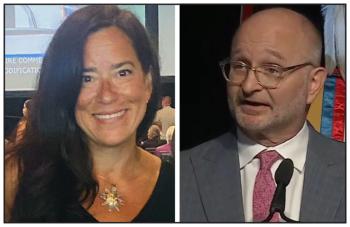Image Caption
Summary
Local Journalism Initiative Reporter
Windspeaker.com
Process is what the federal government’s action plan for the United Nations Declaration Act (UNDA) is all about, said Jody Wilson-Raybould on July 13, the final day of the Assembly of First Nations annual general assembly in Halifax.
And that’s not enough, because “the action plan continues the pattern of process over substance,” said the former Justice minister and attorney general in the Justin Trudeau Liberal government about Canada’s legislation to implement the United Nations Declaration on the Rights of Indigenous Peoples.
An hour later, current Justice Minister and Attorney General David Lametti told those same chiefs that the action plan will, in fact, be used as a “process to work together (and)…address questions…through the basic principles that are articulated in the action plan.”
But, as far as Wilson-Raybould is concerned, UNDA is “lots of lofty rhetoric.”
“The passage of this legislation has not resulted in one piece of land being given back, treaty promises being upheld, a family lifted out of poverty, a nation moving out from under the Indian Act or clean drinking water running in a home on reserve,” Wilson-Raybould said.
What change there has been, she said, has been slow and inconsistent and “every little bit of progress requires massive efforts by our nations.”
Citing her own experiences within the federal government about recognition of Indigenous rights, she said the inconsistent plodding can be blamed on the “limited understanding” of government about the implementation of treaties or how transformative change was required to support self-determination and self-governance.
“It was like I was from a different planet,” said Wilson-Raybould about her time in Parliament.
After resigning in early 2019 from Cabinet alleging interference by Prime Minister Trudeau over the prosecution of SNC-Lavalin, Wilson-Raybould was subsequently kicked out of the Liberal caucus. She sat as an independent for about eight months before running in the 2019 election as an independent and winning. She did not seek re-election in 2021.
She said UNDA follows the Liberal government’s usual strategy of saying the right thing but not making any changes.
“It’s a starting point for more talking and not action,” said Wilson-Raybould, who points out that the actions are about setting up engagements, processes, guidance and co-development.
Not only that, she added, the action plan restates commitments that already exist.
As a minister, she said it was her experience that the government used engagement and consultation as a means to delay “what they know needs to be done.”
Wilson-Raybould emphasized that Indigenous people had the solutions, something that was clearly documented in numerous reports and studies, including the Calls to Action from the Truth and Reconciliation Commission on the legacy of Indian residential schools and the final report from the National Inquiry into Missing and Murdered Indigenous Women and Girls.
“In other words, we do not need an action plan that is a starting point to more consultation,” she said.
What’s needed are the tangible actions to implement the solutions already identified by Indigenous people, she said.
The action plan is supposed to meet the needs outlined by the United Nations Declaration on the Rights of Indigenous Peoples and that means doing away with colonialism.
“I'm not sure that it is sufficiently principled, tangible or a measurable remedy to colonialism here,” she said.
Wilson-Raybould said the action plan undermined the rights holders as it refers to Indigenous partners, organizations and groups.
“UNDA as a piece of legislation has no practical tools,” she said.
Wilson-Raybould went farther saying the government did not understand its own legislation or action plan as they had no supports in place for nations to self-determine or self-govern.
The government does not understand what is required to “deconstruct the ongoing colonial legacy and transform,” she said.
But Lametti said he would commit to work with First Nations to identify and strip away the “layers of colonialism.”
“That's the best I can do,” he said. “Anybody who promises instantaneous results is misleading you.”
Lametti insisted that the action plan, with its 181 individual measures, would result in tangible ways to achieve the objectives set out in the UN Declaration and would advance reconciliation.
He said the plan “contemplates” the development of independent mechanisms for holding Canada accountable for implementing the UN Declaration.
The action plan identifies the “key next steps” to ensure federal laws are made consistent with the UN Declaration “over time,” he said.
As a living road map, he said, work would “continue to evolve” in consultation, in cooperation and in co-development with Indigenous peoples.
The government released its action plan on June 21, two years after passing UNDA legislation to implement the UN Declaration, which sets out the minimal standards for the survival, dignity and well-being of Indigenous peoples around the world.
Local Journalism Initiative Reporters are supported by a financial contribution made by the Government of Canada.

